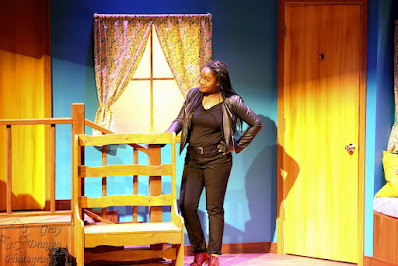Escaping narrow representation in art and life: Phoenix's 'No AIDS, No Maids' opens
 |
| At home with bright decor, the Moderator scrutinizes her prospects. |
The questions that "No AIDS, No Maids" raises create a kind of pre-echo that anticipates the personal issues raised by Dee Dee Batteast, the playwright. Society's current irritations about race and sexuality are percolating in our minds from the start; how they are handled in this one-woman show follows closely behind.
The new Phoenix Theatre production reflects the show's origins in a fringe festival (Washington, D.C.'s). Befitting the one-hour limit of the format and each show's need to register quickly with potentially distracted audiences, there's a message, pointed and definitive, to match the fringe-theater vibe. The title signals it in absolute terms. The author underlines it in censorable fashion with the subtitle: "Stories I Can't F*ckin' Hear No More."
Performed by LaKesha Lorene at the Phoenix, "No AIDS, No Maids" is explicit and forceful in delivering Batteast's hostility to stereotypes and suspect narratives in popular media about gay men and black women. The gist of her objections is that as film, theater, and television characters, those populations are present only to project their heart-rending victimhood and their usefulness to white heroism, allyship, and openness to crossing barriers (to a limited extent).
When narratives about these historically marginalized people enter the mass media, they are often without personal histories, making their portrayal functional and in a certain sense transactional. Imagine what that does to the mere marketability of black and gay actors and to the opportunities to develop their craft. Lorene makes clear her need, voicing the playwright's insight, to be done with accepting limitations on the portrayal of black women; she leaves the gay-white-male battle to others. The history that concerns Batteast runs from the stern, maternal, heart-of-gold slave, whose icon is Hattie McDaniel (Mammy in "Gone With the Wind"), up through countless maids and best buddies of contemporary white heroines. No more Scarlett's dearest friend, in other words, is what this play proclaims.
Batteaste's agenda necessarily engages the thorny matter that conventional narratives are inevitably flawed by bias, and therefore only "lived experience" provides the credentials for telling a story. I'm flatly opposed to such a restriction, and it's stunningly popular on social media. Yet I can acknowledge the justice behind her objections to the dominant manner of assigning roles: how little it reflects reality, how much it affects employability.
There's a poignant scene in which an offstage voice, presumably of a casting director, needles the auditioning Moderator enacting a hairdresser into ever-harsher depictions of the expected strong-black-woman attitude. The presumed effect is to insist that aspirants who fit
 |
| The Moderator in lecture mode discourses on deficiencies. |
the announced racial requirements model anything they try out for along certain narrow lines. Roles that are more freely conceived from the outset outside the strereotypes may not be available.
The production has three playing areas, with two screens high above for projecting video clips and memelike still photos with verbal punches included. MeJah Balams' set design is splendid, focusing on a home environment on one side, a high platform on the other for delivering some quasi-academic messages. Sound and projection designs by Matt Tibbs compatibly carry the production far beyond the fringe-festival norm. Tonie Smith's costume designs include a vital, sharply satirical "minstrel" outfit in which Lorene can mock neo-vaudeville expectations of 21st-century black performers.
Laura Glover's lighting lends a touch of spectacle and dramatic nuance to the central virtue of the show: Lorene's riveting portrayal, especially her physical self-assertiveness and her penetrating eyes (relevantly highlighted in the script). If you attend "No AIDS, No Maids" between now and May 22, it's in more than one sense that the actor will seem to look right through you.
[Photos by Gray Dragon Photography]



Comments
Post a Comment